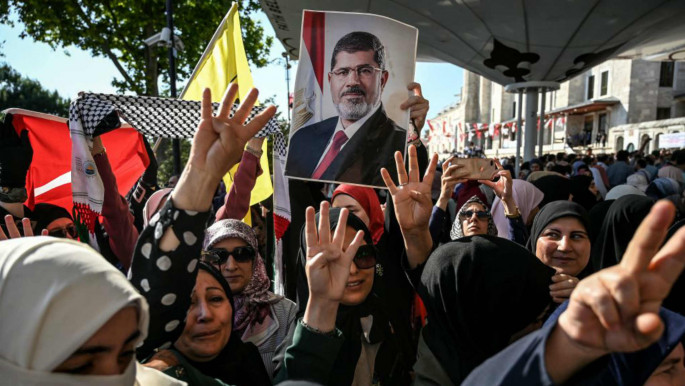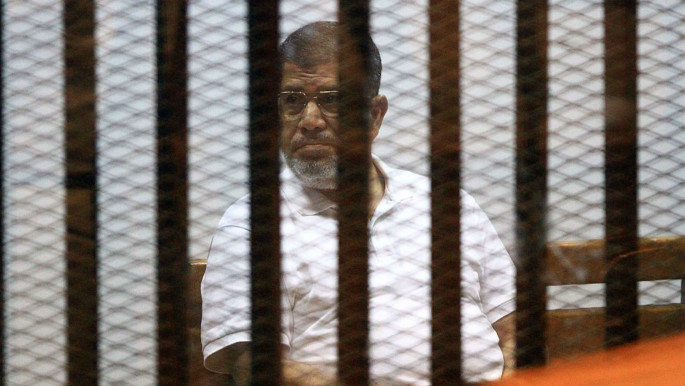Morsi's death: Revenge accomplished, autocracy wins in Egypt
News of the sudden death of deposed Egyptian president Mohamed Morsi sent shock waves in Egypt and around the world amid sympathy, indignation and calls for an impartial investigation.
Morsi was declared dead on June 17 after collapsing inside a soundproof cage during a retrial hearing in a Cairo court. He fainted moments after addressing the court where he was being tried on charges of espionage and links to the Palestinian group Hamas, which had close ties to the Muslim Brotherhood.
State television was quick to report that he had died of a heart attack, while friends and colleagues of Morsi have accused security forces of killing him, claiming that police did not provide first aid fast enough when he collapsed.
Reactions also circulated on social media amid silence in the Egyptian press and the absence of public expression in the streets.
There were polarised views between government supporters denying mistreatment in jail and deeming the death "natural," while opponents and human rights defenders questioned the detention conditions that have led to the tragic end, and sympathisers claiming that Morsi was intentionally killed.
But for many, his death marked the accomplishment of a vindictive act that aimed to destroy and erase a political symbol of a period in Egypt's history.
 |
Friends and colleagues of Morsi have accused security forces of killing the him and claim that police did not provide first aid fast enough when he collapsed |  |
"I don't know where I'm going with this but it's impossible not to be saddened by his death. It is cruel and vile. It was facilitated by the horrific conditions of his imprisonments. But it's what Sisi's regime is about: revenge," Mosa'ab Elshamy, Cairo-born Associated Press photojournalist, tweeted.
"Blah blah blah blah about his death, first democratic president and no one mentioned that he was a TERRORIST and his gang MB have killed hundreds and threatened thousands of people around the globe," wrote an Egypt-based Twitter user with the name of Maya.
"The death in court of Mohamed Morsi completed the incarcerated former Egyptian president's unlikely metamorphosis from mediocre mundanity to mythical martyr whose political ghost will live on for years," Belgian-Egyptian independent writer Khaled Diab said in a post.
 |
|
"Morsi's death pains me more than I ever thought I would. I have strongly opposed him when he was in office, but his death – in my opinion – amounts to murder, through a mixture of negligence and vengeance," an Egyptian called Mohammed Yahia posted in a tweet.
Morsi had been kept in jail for almost six years following his ouster in a July 2013 military coup led by current President Abdel Fattah al-Sisi who has been in power since 2014.
"They [the regime] succeeded in their plan. He died inside a courtroom, the place that is supposed to deliver some kind of justice," commented Wael Eskandar, an Egyptian independent journalist and blogger. "He was kept in isolation and slowly murdered. There was no reason or excuse for how he was treated."
 |
|
| People attend the funeral prayer in absentia for Morsi, at Pariser Platz in Germany on June 18 [Getty] |
During his time in prison, Morsi, who was suffering from diabetes, liver and kidney disease, was held in solitary confinement for as much as 23 hours a day, he was denied adequate medical care, deprived of access to lawyers, cut off from communication with the outside world and was allowed only three visits from relatives.
 |
During his time in prison, Morsi, who was suffering from diabetes, liver and kidney disease, was held in solitary confinement for as much as 23 hours a day |  |
His family and activists had repeatedly raised concerns about his ill health and the amount of time he was being forcibly isolated.
Last year, a British parliamentary panel warned that the Egyptian president faced the risk of death in prison if he did not receive urgent medical assistance.
 |
|
| Read also: Morsi wasn't perfect, but when it mattered, he was Egyptians' best hope for freedom |
Although media reports are still unclear as to the cause of Morsi's death, his tragic fate was arguably expected to come.
"It was a matter of time before medical negligence caught him to die," said Eskandar, who is a frequent commentator on Egyptian politics.
"The shocking thing is that he was the president of Egypt, not an ordinary detainee, and the only way there can be negligence with such a high-profile prisoner is if it was premeditated."
Deliberate medical negligence in Egyptian prisons has led to the death of hundreds in detention including prominent figures.
In 2015, Cairo-based Nadeem Center for Rehabilitation of Victims of Violence and Torture documented 81 cases of death in detention centres as a result of medical negligence; 80 cases were reported in 2016. Seven detainees died from the same cause in January 2019 alone.
"The rate of deaths in prison is very concerning, we observe that Egyptian authorities have so far not conducted proper investigation into these deaths," said Hussein Baoumi, Amnesty International's Egypt researcher.
In the infamous Cairo's high-security Scorpions Prison, where those considered enemies of the state, including many Muslim Brotherhood leaders, are being held, detainees are denied medical treatment in ways that contribute to their deaths.
Egyptian political and human rights sources have told The New Arab that the Egyptian Prison administration is pursuing a clear policy of deliberate "medical negligence" against political prisoners, particularly leaders of the Brotherhood. The sources said the violations are perpetrated with the goal of causing the deaths of the greatest possible number of these leaders in prison.
 |
The shocking thing is that he was the president of Egypt, not an ordinary detainee, and the only way there can be negligence with such a high-profile prisoner is if it was premeditated |  |
What happened to Egypt's leader last week is also a reflection of what the Sisi government is doing to the country.
"The death of Morsi spotlights similar conditions that tens of thousands of Egyptian prisoners are suffering," Amnesty's researcher pointed out.
He described prison conditions in Egypt as "dire" and not meeting basic international standards, citing overcrowding, ventilation and lighting, poor sanitary facilities and systematic ill-treatment and torture of inmates.
Research compiled by Amnesty International in May 2018 revealed that dozens of prisoners with a political profile such as members of the opposition, activists and journalists, are held in prolonged solitary confinement to inflict additional punishment that sometimes amounts to torture.
| Article continues below interactive timeline |
Morsi embodied a political symbol of a critical – albeit short – period in Egypt's modern history running between the aftermath of the 2011 revolution, that saw the toppling of long-time dictator Hosni Mubarak, and the country's first free presidential election in 2012 when he became head of the state before he was ousted by the army a year later.
With little prior experience in politics and low leadership stature, he was unpopular and failed to deliver on any of the demands of 25 January revolution.
His divisive year in office triggered domestic criticism that culminated in mass protests against his rule until the military overthrew him on July 3, 2013 bringing Sisi to power.
He was then arrested and has received various long sentences including a life sentence for "spying for Qatar and Hamas" and a 20-year sentence for "detaining and killing anti-government protesters."
"During these years in prison, Morsi wasn't just a detainee but a symbol of what the current political course is about," observed Giuseppe Dentice, an Associate Research Fellow at the Italian Institute for International Political Studies (ISPI).
"He was a character to be publicly exposed and punished live, that would act as a warning to the members of the Muslim Brotherhood and any dissidents that would dare to challenge the regime."
 |
|
Dentice hinted that with the passing of the ex-president, the ruling power symbolically has brushed away the last traces of the after-Arab Spring experience, something that "has to be completely erased" from the memory of the Egyptian people.
"Such inhuman treatment inflicted on Morsi was a hard lesson given to create a punitive conscience," the MENA researcher said. "It also served to introduce a new memory whereby the military is the only alternative, or rather the only national salvation."
After Morsi's removal in August 2013, Egyptian security forces launched a brutal crackdown on the Muslim Brotherhood and anyone suspected of supporting the group, leading to hundreds of people killed and tens of thousands of arbitrary arrests since the coup.
Egypt's democratic process had perished long before his shock death.
According to Eskandar, the slow death of Morsi was the "late result" of a journey that started on July 26, 2013 when Sisi had been mandated by the people to crack down on Islamists (or what they deemed "terrorists") without having to justify their actions.
"We've seen many symbols of death of democracy and we keep seeing more of these symbols since we're in a constant state of autocracy," he said.
 |
We've seen many symbols of death of democracy and we keep seeing more of these symbols since we're in a constant state of autocracy |  |
In reflecting upon the coming period after Morsi's death, Dentice said that the political course will continue without foreseeable changes in the current repressive climate. He thinks that any possible change in Egypt's political landscape could be only expected to come from within the power elites, not from the bottom.
Human rights groups have demanded a thorough and transparent investigation into his death as well as his treatment in custody and his ability to access medical care.
Western governments stayed largely silent about Morsi's prolonged mistreatment until his death as much, as they have stood by in silence at the mass arrests and the deaths of opponents jailed by Sisi's regime, de facto okaying the authoritarian rule to continue with its actions without scrutiny in and outside Egypt.
The international community is now called to hold authorities to account and speak out against the imprisonment of the thousands of Egyptian dissidents.
![Morsi [Getty] Morsi [Getty]](/sites/default/files/styles/image_345x195/public/media/images/0E3DB242-3A7B-42F1-8648-666B88083873.jpg?h=d1cb525d&itok=-KvllQlE)




 Follow the Middle East's top stories in English at The New Arab on Google News
Follow the Middle East's top stories in English at The New Arab on Google News


